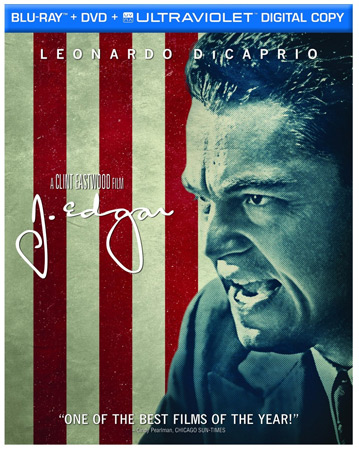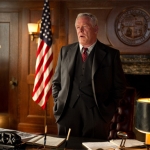
J. Edgar Hoover, touted as once being the most powerful man in the world, is well known as the first director of the FBI and the man behind the Bureau’s growth into a capable and expansive agency. Outside of the public spotlight, Hoover’s private life has become a thing of mystery and speculation. 2011’s J. Edgar, recently released on Blu-ray, attempts to tackle the question of who Hoover was and what motivations drove him.
Clint Eastwood directs this biopic with a script from Milk’s Dustin Lance Black. Leonardo DiCaprio takes on the title role as the legendary lawman. The film opens late in Hoover’s life with DiCaprio buried beneath a heap of convincing age makeup. Hoover summons a writer into his office so that he can share the story of the origins of the FBI. This frames the ensuing narrative, which travels back to 1919 when Attorney General A. Mitchell Palmer survives an assassination attempt. Hoover works under Palmer at the Justice Department and witnesses the aftermath of the bombing that nearly claimed his boss’s life. Observing the lack of precision and regimen in the police investigation at the blast, Hoover sees a need for science in the field of criminology.
With dogged determination, Hoover builds his career at the Justice Department and eventually leads the Bureau of Investigation. It is there that he meets Clyde Tolson (Armie Hammer), the man who would become Hoover’s close friend, confidant, and possibly lover. The possibility of homosexuality and transvestitism long have been elements of the mysteries surrounding Hoover’s life. The truth about Hoover’s sexuality, like many aspects of his private life, has gone unanswered in history and therefore is a point of speculation in the film. Truly, most of what J. Edgar shows us of the man’s life away from the public eye is fiction built from educated guesswork. The cast and crew admit as much in the Blu-ray’s making-of featurette, J. Edgar: The Most Powerful Man in the World.
Much about Hoover’s professional life is a matter of public record, highlighting by his involvement in the investigation into the abduction and murder of the young son of aviator Charles Lindbergh (Josh Lucas). The film plays out Hoover’s career faithfully and paints a portrait of the man as an intimidatingly powerful and driven force for justice at any cost. The private life of Hoover is what we really want to see in such a biopic, however, and it is there that J. Edgar occasionally flounders. The question of the man’s sexuality is broached, but its handling is mostly awkward and chaste. Without firm facts upon which to build Hoover’s personal life in the movie, much of what is shown is played safely and with little subtlety. Similarly, Hoover’s relationship with his mother (Judi Dench) is rife with unnecessarily obvious and convenient exchanges.
The film’s visuals are muted, resulting in low saturation and a lot of gray to black in the colors. The decision to present J. Edgar with a stark look suits both the period of the movie and the central man himself. The movie does have its engaging moments, delivering satisfying accounts of investigation and the building of the Bureau. The private life of Hoover, which should have provided the most intriguing parts of the story, end up mostly disappointing, causing the overall movie to feel a bit disjointed and uneven. In the end, you’ll know a lot more about J. Edgar Hoover than you knew beforehand, but at the same time there’s an emptiness to any knowledge you’ve gained.
J. Edgar released on Blu-ray on February 21, 2012 with a combo pack that includes the film on DVD and Blu-ray, along with an Ultraviolet downloadable digital copy.






